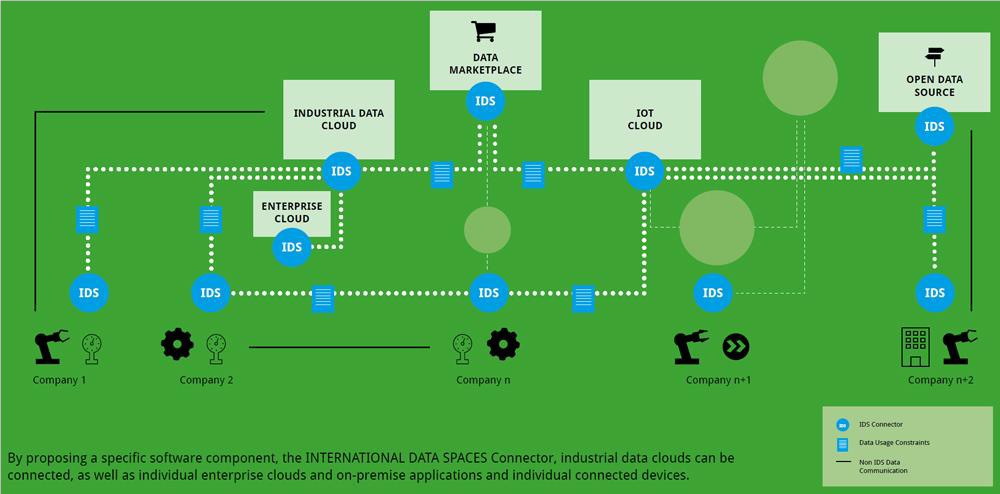Many digitalization projects have data sharing at the heart of it. What these projects have in similar is that data needs to be shared in a controlled way and the solution needs to be deployed at a large scale with minimal implementation effort.
Below, you can find more about International Data Spaces indicate how you can use it in your proposal. IDS is only one of the possible applications you can use for your experiment and this article is meant to inspire you on how you to apply for the DIHNET open call and help your company innovate.
What is International Data Spaces?
International Data Spaces (IDS) is a European reference architecture for data sharing, which can be used to kick-start many project proposals that require data to be shared between different companies. Within the context of the DIHNET project you can get knowledge and technological support to develop your own use case based on IDS.
The non-profit ‘International Data Spaces Association’ (IDSA) provides standards and a reference architecture to set-up such an environment. The association was founded (initially) in Germany and has over 100 members from across Europe. Many companies have started to develop components which adhere to this standard. In addition, over 50 use cases are being deployed across Europe in many different sectors – manufacturing industry, logistics, finance, health, energy, etc.
IDS can be used for many different purposes:
- Provide a ‘Connector’ through which organizations can share data.
- Connect to existing and new Internet of Things and cloud platforms.
- Enable new smart applications (mobile apps, web applications, etc.) and integrate them with existing backends.
- Provide shared functionalities in a data ecosystem, such as brokerage (finding data), clearing house (registering transactions), identity management and trust.
- Use for a 1:1 connection between two companies, set-up data sharing between many companies or build a data marketplace.
The picture below provides an overview where IDS technologies can play a role.

Like centralized cloud platforms, IDS provides the ability to quickly scale your data sharing use case. The key differentiator however is that IDS enables companies to retain full control over their own data – ‘data sovereignty’. Each participant can implement its part of IDS and is fully interoperable with others. In addition, IDS can work with virtually all existing software.
You can find out more details on International Data Spaces website
How can it benefit your project proposal?
If your proposal has a data sharing component in it, the IDS reference architecture can provide you with many necessary building blocks. This means that you can leverage existing investments and existing solutions. You can focus on the things which are specific to your proposal.
It is also possible (but not mandatory) to join the International Data Spaces Association afterwards. This provides you with a platform to learn from others and to disseminate your solution in other markets.
In addition, the IDS standard will become part of the future European cloud initiatives (e.g. GAIA-X). This puts your project in an ideal position for future European investments, e.g. as part of the upcoming Digital Europe investment programme of the European Union.
How can DIHNET help?
Since TNO, the national hub for IDS in the Netherlands, is our consortium partner you can find support with:
• Reference implementations of the standards so you can focus on your case-specific elements,
• Assistance with recruitment of the organizations willing to adopt it. This can either be as part of a use case or as part of a new technology offering.
• Access to European network of technology providers, potential users and investors in the technology.
Example use cases
Several manufacturing companies want to share data on shipments to their customers, so they can combine it into trucks of different logistics companies.
IDS provides a ‘connector’ to all manufacturing companies and logistics companies. Each manufacturing company can decide with which logistics company it wants to share data with. Data is protected from manufacturing competitors.
The IDS Connector is integrated with existing back end systems and new smart apps to combine logistics data. Within the ecosystem the broker role enables manufacturing companies to find suitable logistics companies. The clearing house registers transaction, which can be used to facilitate the invoicing process afterwards.
Submit your application until 15th of September.
Visit the application page or contact the helpdesk.
